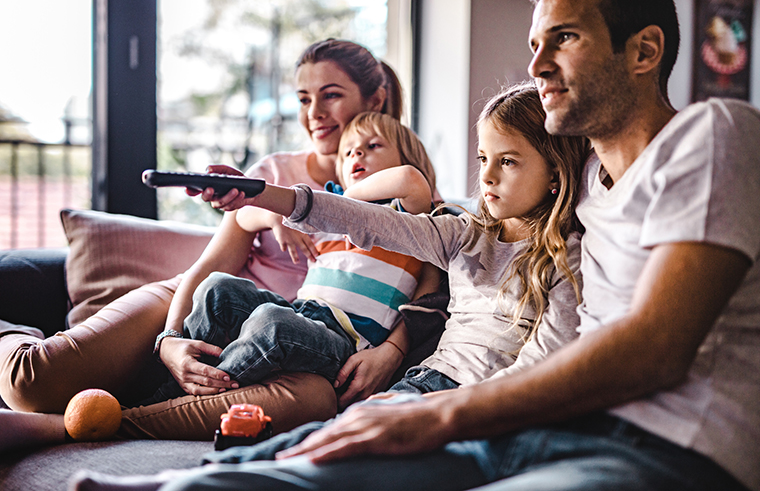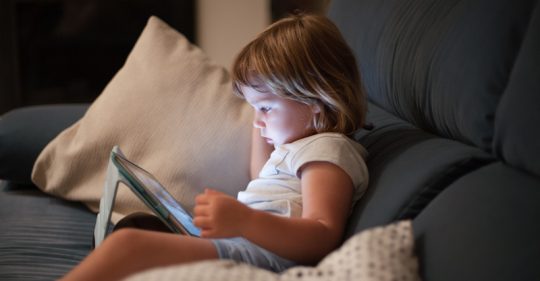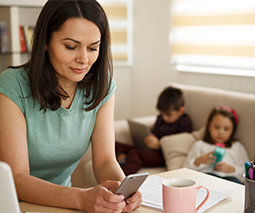How long is too long in front of a screen?

In a perfect world, the TV wouldn’t be on all the time – but it’s not a perfect world.
I’m not going to beat around the bush, the television is on at our place in the morning. It’s actually been a fixture since my oldest started daycare at 11 months old.
Back then I had a full-time job and the television kept him amused while I had a quick shower and got dressed.
Five years on, and television still features in our morning routine – only now there are a few rules in place.
- He must be dressed (I actually get him dressed as soon as he’s up on daycare days)
- Some food must have passed through his mouth
- Extra points for making the bed (he’s just started!)
These three things mean he’s ready to go when I’m ready to go, and I don’t need to spend too much time wrestling him out the door.
But that’s where my smugness ends.

How a TV-free morning routine works
My friend Donné and her four-and-a-half-year-old son Hendrix, however, have a strictly no-TV morning routine.
“We have a no-TV rule during the week (evenings and weekends are OK),” says Donné, “but that doesn’t stop him checking every three days or so!”
Donné and Hendrix’s TV-free morning routine:
- We eat breakfast together. We usually read something or play a game while eating.
- Hendrix has an art table in his room. When it’s time to shower, I send him in there to make something and then spend the next 10 minutes panicking furiously while wet and incapacitated, calling out ‘WHAT ARE YOU DOING NOW?!’ every thirty seconds or so. Sometimes I’m treated to a picture, sometimes it’s glue all over the floor. It’s the risk I roll with.
- Sometimes it’s easy. I always get him ready before attempting to deal with myself. Then I just send him to play. When he was smaller, I’d set up a little stool at the bathroom door and have him sit on it while eating his breakfast and talking to me in the shower.
- When I’m doing my makeup, he usually gets some too.
- I can afford to take my time in the mornings because the kid’s ALWAYS awake so early.
Be realistic
While I’m a little in awe of this morning routine at Donné’s place, even she admits that sticking with it all the time is nearly impossible.
“If I have a deadline, or I’m a week into solo parenting, this flies out the window!”
Children’s technology researcher, Kristy Goodwin says that in a perfect world, TV probably wouldn’t be part of a morning routine – but who lives in a perfect world?
We need to be realistic, says Kristy. The key to effectively managing morning TV behaviour (like anything parenting-related) is to set good boundaries.
Be mindful
TV and some gaming on devices is okay if you’re mindful of what your child is watching and playing.
“Teachers actually tell me that they can tell which children have been watching television before school starts because they find it very hard to focus,” says Kristy. “They’re distracted and unproductive and also quite distracting for the other kids in the class.”
Stick to slower-paced shows like documentaries if there’s enough interest; that is, nothing too fast or loud, or hyper-arousing. And games that inspire creativity (art, or telling a story) should be the first preference.
How long is too long?
“That’s a hard one,” says Kristy.
“We’d all like to be handed a screen time fact sheet. It’s actually impossible to create one because all kids are different. Observe your children in front of the screen for about 15 minutes and see how they’re coping.”
The Sydney Children’s Hospital Network recommends that children aged under 2 years not routinely be given screen time unless video chatting, and that children aged 2 to 5 years only be exposed to 1 to 2 hours of high quality programming per day. Once your child begins school, then as a family, you need to discuss how best to use screen time to reduce excessive use. Screen time is not recommended for children under 2 years. But again, if you’re a single parent or in lockdown, those rules might need to be bent a little so that there are better mental health outcomes for parents as well as kids.
Set boundaries
Kristy says the rules we have for our son around getting dressed and eating first are good, although it’s important the iPad/TV time isn’t considered an instant reward for good behaviour.
“Have a conversation about your expectations the night before. Explain that by getting dressed and having something to eat first means they’ll be ready to go, which means if there’s time left they can watch something on the TV or iPad. The bonus is that they will be far more compliant!” says Kristy.
This post was originally published on Kinderling Kids Radio. Download the Kinderling app for more great stories.
 Need some support to be the best parent you can be? Our Parent School parent coaching experts can help. Click to find out more or book a one-on-one session.
Need some support to be the best parent you can be? Our Parent School parent coaching experts can help. Click to find out more or book a one-on-one session.









